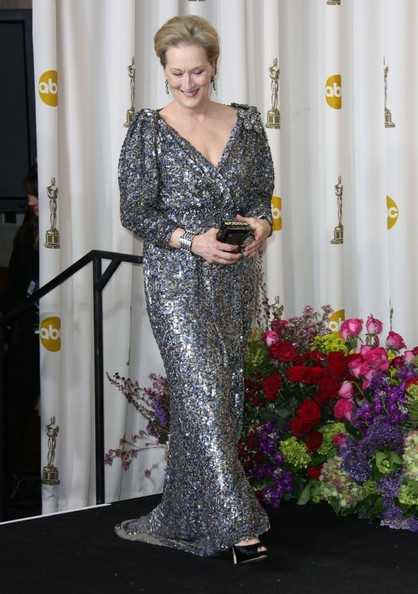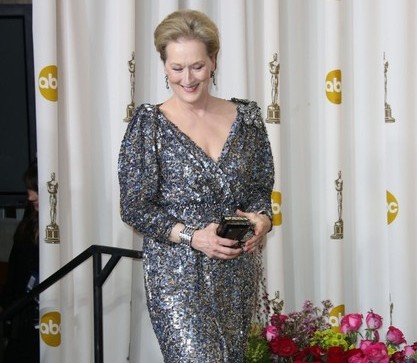
As a woman in the media, and as one who’s passionate about film, TV and the arts, I’ve been deeply distressed by the data we see daily regarding the lack of women in leadership and power positions in the film and TV industry, both on screen and behind it.
As of 2014, women constituted only 17% of all directors, writers, producers, executive producers, editors, and cinematographers working on the top 250 (domestic) grossing films. Shockingly, this is the same percentage of women working in these roles in 1998. The needle hasn’t moved.
I was thrilled, then, to learn this week that Meryl Streep has funded a new Writer’s Lab incubation program designed to help women over 40 develop their screenplays, with expert-level mentorship and support of some of the industry’s top voices and contributors in film today.
Personally speaking, I have a screenplay idea I’ve been longing to develop, and just reading about this empowering, supportive new program for women screenwriters reignited my passion and excitement to move forward to make it a reality anyway I can.
To learn more about the Writers Lab and its mission and purpose, I caught up with the co-founders — Kyle Ann Stokes, Elizabeth Kaiden and Nitza Wilon — who also founded IRIS, a collective of women filmmakers dedicated to championing the female voice through fictional narrative film. The Writers Lab is their dream child, and a collaboration between New York Women in Film & Television (NYWIFT) and IRIS.
Here’s what they shared.
Kathy Caprino: Why launch the Writer’s Lab now? What needs does it address?
Elizabeth Kaiden: We are women writers over 40. We founded Iris because we were frustrated. In talking about the challenges we face, we realized that people don’t support the craft of writing anymore. The cornerstone of film is the script. From long experience, we know that writing needs time to grow and space to breathe, and it is critical to extricate from our over-stimulating culture and let in some light and air. So, we need more development labs.
Kyle Ann Stokes: Development money has basically evaporated. The studios closed most of their development offices in the 1990s and they were the ones with the money. Since then, labs such as the Sundance lab have evolved into these wonderful creative incubators where filmmakers and screenwriters have the opportunity to develop their voices. But there are too few and therefore the competition is fierce – not that competition is bad, there is just a need for more. However, the focus on women is key, as the female narrative is marginalized. Actually we are at a time when this has really been magnified because popular culture seems to have finally caught on to this fact, our cultural narrative has been dictated by the male voice and women are just learning to own their own voices. Young women are stronger than ever – up to a point.
Caprino: Why target women over 40?
Kaiden: There are nearly 77 million women over 40 in the United States, nearly 25% of the total population. Doors do not open for this demographic. In fact, they routinely slam shut. So many of these women have something to say.
Nitza Wilon: Women over 40 have knowledge, experience, ideas, perspective, and a wealth of stories to tell. And they want to watch movies that speak to them.
Stokes: Most stories told on screen are about a male protagonist. I think I watched Out of Africa (with Meryl Streep playing the protagonist Karen Blixen) a zillion times. We are the lost generation that is still alive. As young women growing up, we did not have the same opportunities that young women have today: the internet, digital filmmaking, non-linear editing, film schools all over the country, women in leadership roles, women in the director’s chair.
Caprino: About Meryl Streep’s support – what is her particular vision for the Lab and how does she see this moving the needle for women in film?
Wilon: Ms. Streep has been associated with NYWIFT for a long time, and she’s spoken out on behalf of women in the industry many times. We were thrilled by Patricia Arquette’s remarks at the Oscars and Ms. Streep’s reaction and hoped that she would make a donation to support the project — and she gave us the full funding! We are so grateful to her. Her involvement is as a funder; Iris and NYWIFT are producing the Lab.
Caprino: Taking a look at the bigger picture, what holds women back today from playing a bigger creative role in film and TV?
Kaiden: I’m not an ideological extremist, but men get the jobs because men hold the power, in film as in most industries. On top of that, the absurd expectation that 24/7 availability is requisite to do a job well doesn’t work for many women over 40. Let’s be honest: We have children, partners, parents, households, and jobs and, even in 2015, we often shoulder those responsibilities disproportionately.
Wilon: There are all kinds of impediments: internal and external, personal and societal. And, they’re not going away. What we found, though, is that when we formed our group, the IRIS Collective, the combined energy was galvanizing. Women can and should draw strength and power from each other. Whatever was holding each of us back became surmountable. By going to NYWIFT – another kickass group of women – with this idea, we expanded the paradigm. We pitched the idea to Terry Lawler, Executive Director of New York Women in Film & Television, and she basically said ‘Get to work!’
Caprino: How will this Lab help specifically?
Stokes: Our goal is to bring audiences voices that have been traditionally ignored or excluded. We need more scripts by women so we can finally start to achieve some balance in film.
Kaiden: From the Lab, we expect eight distinct, viable screenplays to emerge that we hope will springboard to the next stage of production. This Lab will raise awareness, shift the balance, and get the snowball rolling.
Caprino: How are the eight mentors of the lab hoping to be of hands-on help to the selected finalists?
Kaiden: We are thrilled and honored to count among our mentors some of the most brilliant and successful women in film today. Their collective experience will be invaluable to the selected writers. Each writer will work with two different mentors in one-on-one meetings to determine how to develop her script most successfully.
Wilon: They are going to be in the trenches. This is not a glamor-fest – it’s for real writers who are passionate about honing their craft.
Stokes: Film is ultimately a collaborative business; making a movie is a team effort. A screenwriter needs contacts, a network, people who know about her work and believe in it. These mentors all bring different assets to the retreat. As a group, they will provide varied and immeasurable support.
Caprino: What’s the ultimate vision for this initiative in the future?
Stokes: To expand and grow! I want the female narrative to be fully present.
Wilon: I answered 150 emails about the Lab the day the news hit, and the overwhelming sentiment from women all over the world, was: “Finally!” If we had any doubts that we were onto something worthwhile, we doubt no more. For our inaugural lab, we are fiercely determined to find and nurture eight screenwriters whose films will then rocket to the Cineplex near you. And down the line? We’d love to include television writers, directors, and women outside the US. But ultimately? Let’s change how women participate in the industry as a whole.
For more information about the Writers Lab and submissions, click here.
 Kathy Caprino, M.A. is a nationally-recognized career success coach, writer, trainer and speaker dedicated to the advancement of women in business. She is the author of Breakdown, Breakthrough:The Professional Woman’s Guide to Claiming a Life of Passion, Power and Purpose, and Founder/President of Ellia Communications, Inc. and the Amazing Career Project, focused on helping professional women build successful, rewarding careers of significance. A Forbes, Huffington Post and LinkedIn contributor and top media source on women’s career and workplace issues, she has appeared in over 100 leading newspapers and magazines and on national radio and television. For more information, visit www.kathycaprino.com and connect with Kathy on: Twitter, FB, LinkedIn.
Kathy Caprino, M.A. is a nationally-recognized career success coach, writer, trainer and speaker dedicated to the advancement of women in business. She is the author of Breakdown, Breakthrough:The Professional Woman’s Guide to Claiming a Life of Passion, Power and Purpose, and Founder/President of Ellia Communications, Inc. and the Amazing Career Project, focused on helping professional women build successful, rewarding careers of significance. A Forbes, Huffington Post and LinkedIn contributor and top media source on women’s career and workplace issues, she has appeared in over 100 leading newspapers and magazines and on national radio and television. For more information, visit www.kathycaprino.com and connect with Kathy on: Twitter, FB, LinkedIn.
This article originally appeared in Forbes.






Add Comment